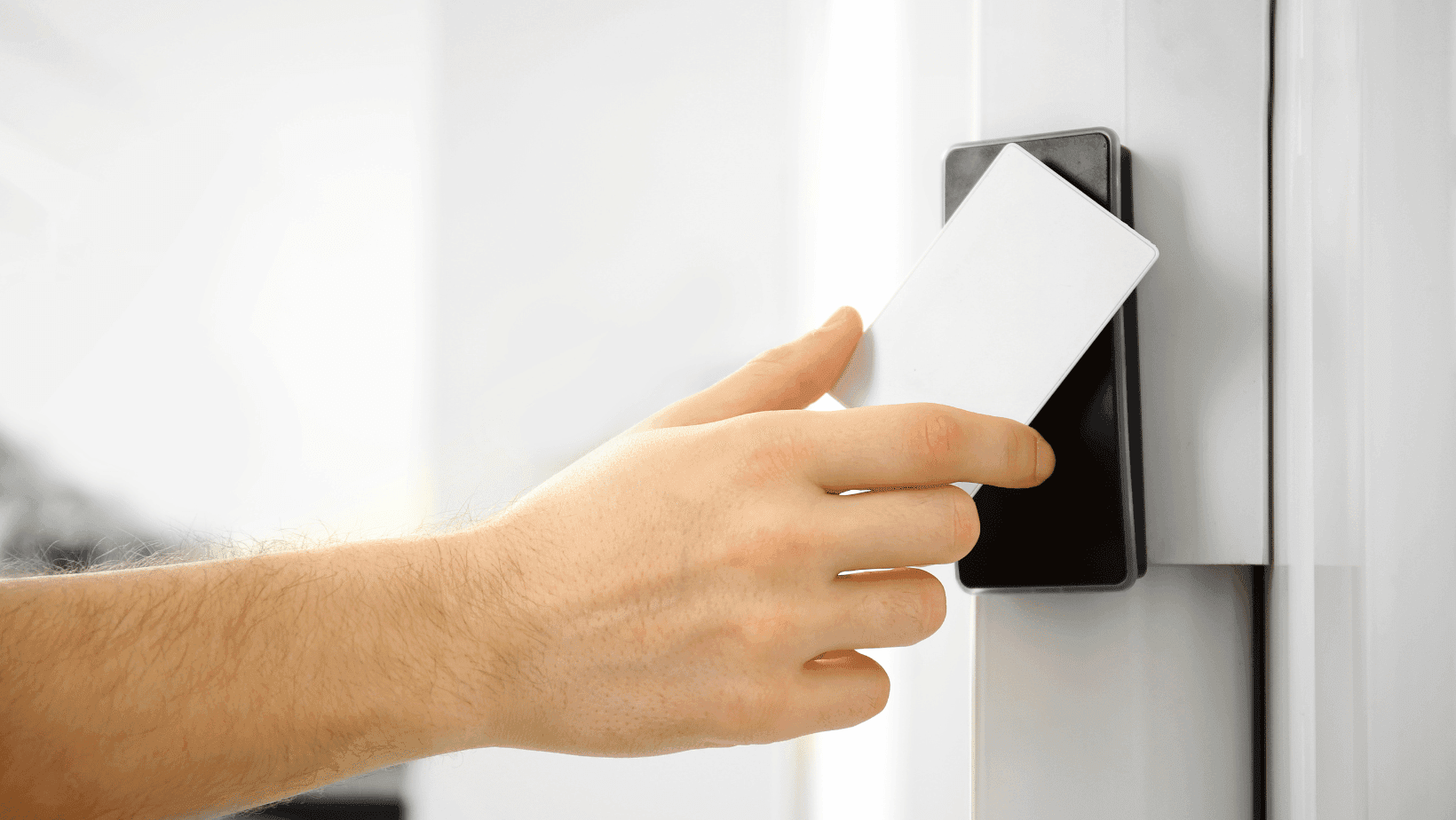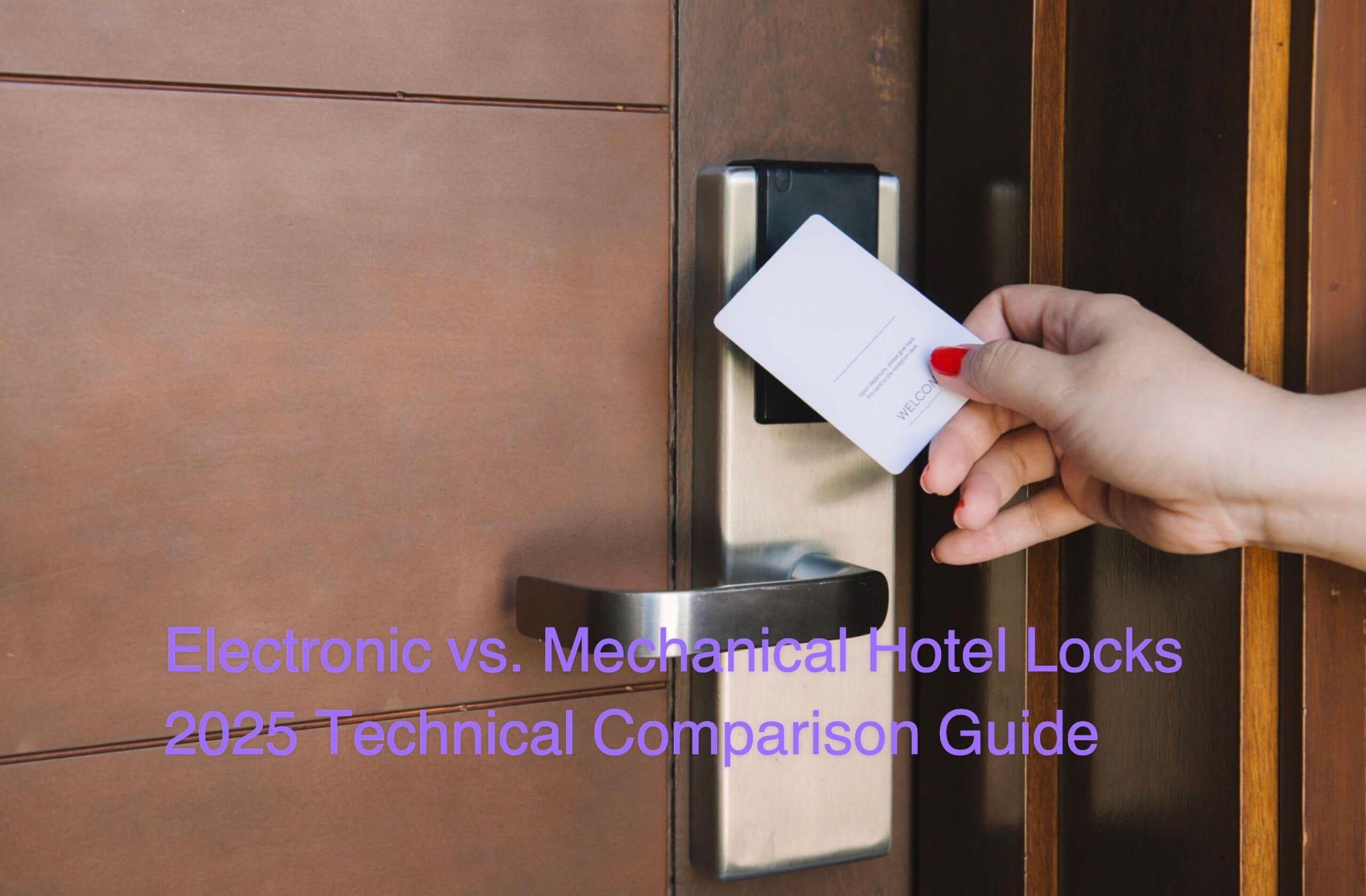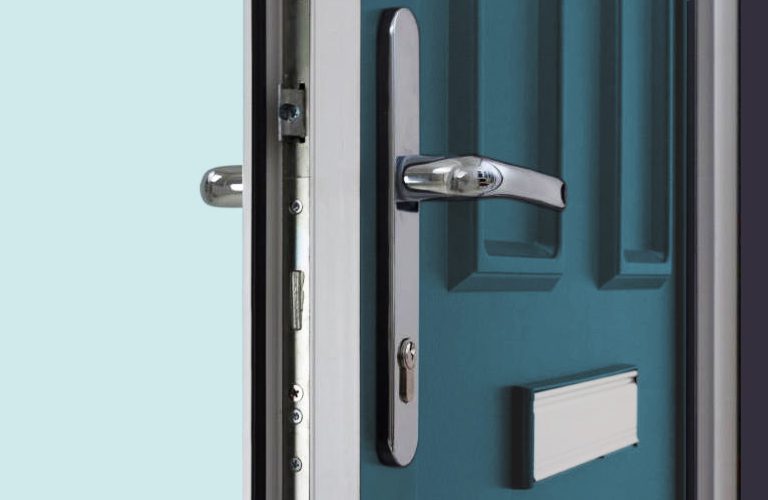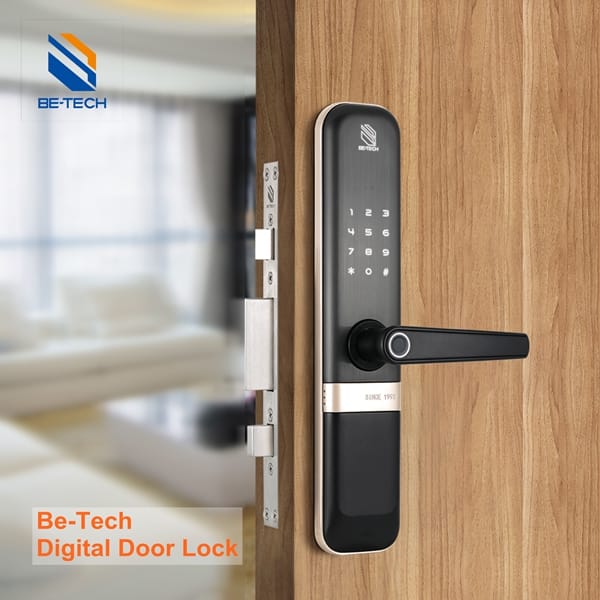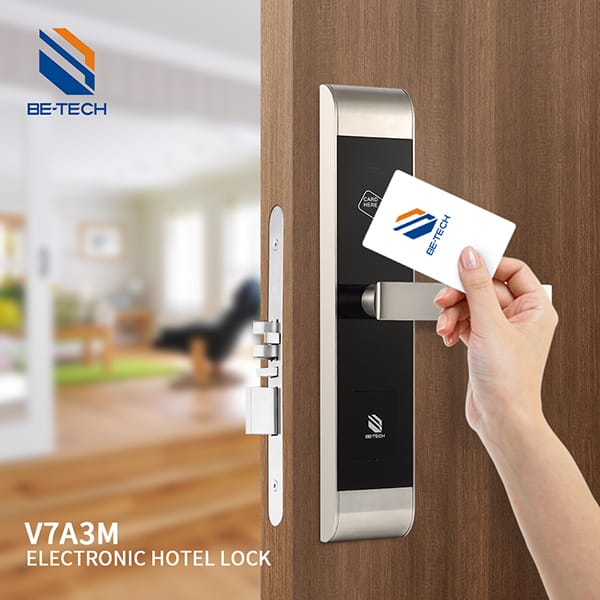Electronic door lock systems have become a cornerstone of modern security, particularly in the hospitality industry. These systems offer a range of access methods, including RFID (Radio Frequency Identification), keypad, biometric (fingerprint identification), and Bluetooth. Each system is equipped with an access control system that meticulously records every interaction, tracking key card usage in real-time. This article delves into the intricacies of electronic door lock systems, highlighting their benefits, operational efficiency, and the advanced features of the Be-Tech Door Control System.
Types of Electronic Door Lock Systems
Electronic door locks have transformed security by providing advanced features and convenience compared to traditional mechanical locks. This guide explores various types of electronic door lock systems, highlighting their unique characteristics and applications.
RFID (Radio Frequency Identification) Locks
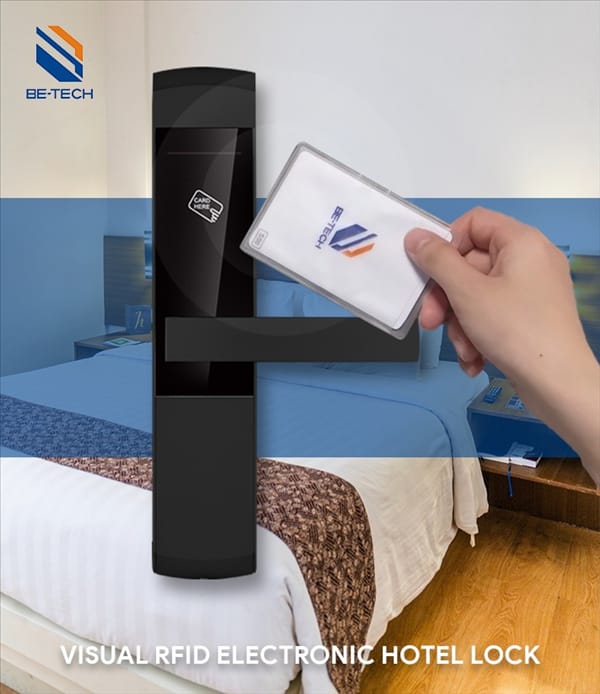
RFID locks are prevalent in hotels and commercial buildings due to their user-friendly design and robust security benefits. These systems utilize radio waves for contactless entry between an RFID-enabled card or fob and the lock. Key features include:
Access Logs: Maintain detailed logs of access events for enhanced security management.
System Integration: Easily integrates with existing security systems for comprehensive protection.
User Convenience: Guests can unlock doors simply by presenting their RFID-enabled card or fob, streamlining access for both guests and staff.
Keypad Locks

Keypad locks require users to enter a PIN code for access, eliminating reliance on physical keys. This type is ideal for high-traffic areas like hotels and offices. Important aspects include:
Enhanced Security: Regular updates to PIN codes mitigate risks associated with lost or stolen keys.
Auto-lock Features: Many models feature auto-lock capabilities, ensuring doors remain secure after use.
Customizable Access Codes: Users can create temporary codes for guests or service personnel, offering flexible access control options.
Biometric Locks

Biometric locks grant access through unique biological traits such as fingerprints or facial recognition. These locks are known for their high-security levels and are suitable for sensitive areas within facilities. Key points include:
Superior Security: Biometric data is challenging to replicate, significantly reducing unauthorized access risks.
Quick Access: Users can gain entry rapidly without needing keys or remembering codes, which is particularly beneficial during emergencies.
Integration Capabilities: These locks can connect with broader security frameworks for comprehensive monitoring and management.
Bluetooth Locks
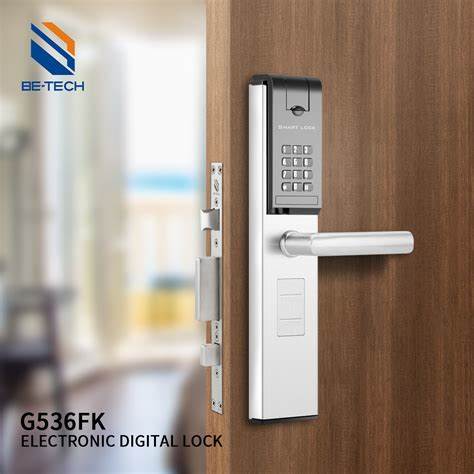
Bluetooth locks connect directly to smartphones via Bluetooth technology, allowing users to unlock doors using a mobile app. Features include:
Remote Access Management: Users can grant temporary access remotely through their smartphones.
User-Friendly Experience: Unlocking doors without physical interaction enhances convenience for tech-savvy users.
Smart Home Compatibility: Bluetooth locks can integrate into smart home systems, working seamlessly with other devices like security cameras and alarms.
Electronic door lock systems provide enhanced security, convenience, and flexibility compared to traditional locking mechanisms. Each type caters to different needs, making them suitable for various applications from residential homes to commercial properties.
Enhancing Operational Efficiency with Electronic Door Lock Systems
The integration of electronic door lock systems in hotels significantly improves operational efficiency and guest satisfaction by providing real-time updates on room availability and facilitating seamless communication between departments.
Benefits of Real-Time Updates
Electronic door lock systems deliver immediate notifications regarding room status changes, crucial for hotel operations. When a guest checks out, the system instantly updates availability, allowing front desk staff to manage bookings effectively and minimizing double-booking risks. This capability enables housekeeping teams to prioritize room cleaning efficiently, ensuring that new guests can check in without delay.
Key advantages include:
- Immediate alerts when rooms become vacant
- Enhanced resource allocation for housekeeping
- Reduced errors in booking management
Streamlined Interdepartmental Coordination
Effective communication between front desk staff and housekeeping is essential for delivering exceptional service standards. Electronic door lock systems support this coordination by ensuring all team members have access to up-to-date information on room readiness and guest preferences.
Advantages include:
- Quick sharing of critical information
- Improved guest experience through timely service
- Enhanced teamwork among staff members
Electronic door lock systems are vital not only for security but also for optimizing hotel management processes. By providing real-time updates and fostering interdepartmental collaboration, these systems create a responsive environment that prioritizes guest needs and operational excellence.
Harnessing the Potential of the Be-Tech Door Control System
The Be-Tech Door Control System is an advanced solution designed specifically for enhancing security and operational efficiency across various environments, particularly in hospitality and commercial sectors. This system offers flexible scheduling capabilities, detailed access management features, and seamless integration with existing security frameworks.
Customizable Schedules
One of the key benefits of the Be-Tech Door Control System is its ability to create customizable schedules tailored for different access points. Organizations can:
Define precise unlocking and locking times based on operational hours.
Set premeditated schedules for holidays and weekends, ensuring doors remain securely locked outside business hours.
Customize access permissions for specific individuals or groups to enhance security by limiting entry to authorized personnel only.
This customization not only strengthens security but also streamlines operations by automating access management processes efficiently.
Access Control for Secured Zones
The Be-Tech system excels in managing access to secured zones through its comprehensive scheduling capabilities. Key features include:
Individualized Access Control: Each secured area can maintain its unique schedule or share a common schedule with multiple doors, providing flexibility in access rights management.
Real-Time Monitoring Capabilities: The system logs all access attempts, allowing administrators to track who accessed which areas and when, thereby enhancing accountability.
Integration with Existing Systems: The Be-Tech Door Control System integrates seamlessly with hotel management systems and other property management tools, facilitating centralized control over access permissions and monitoring lock statuses from a single interface.
These integrations significantly improve guest satisfaction by streamlining check-in and check-out processes while reducing administrative burdens.
Enhanced Security Features
The Be-Tech Door Control System incorporates advanced security measures that significantly mitigate unauthorized access risks. These features include:
Electronic Authentication Methods: Utilizing RFID technology, biometric recognition, and mobile credentials ensures that only authorized users gain entry.
Comprehensive Audit Trails: The system maintains detailed logs of all access events for audits and compliance checks, allowing organizations to refine their security protocols based on actual usage patterns.
Remote Management Capabilities: Administrators can grant or revoke access permissions remotely, enabling swift adjustments based on changing security needs or circumstances.
Operational Efficiency
Implementing the Be-Tech Door Control System can yield substantial operational efficiencies:
Reduction in Physical Key Usage: Transitioning to electronic locks and mobile credentials eliminates costs associated with key management and replacement.
Streamlined Visitor Management Processes: Temporary access can be easily granted or revoked during client meetings or contractor visits without compromising overall safety protocols.
Cost Savings Through Automation: Automating locking mechanisms reduces reliance on security personnel while ensuring that only authorized individuals have access during specified times.
The Be-Tech Door Control System represents a significant advancement in access control technology across various environments. By leveraging customizable scheduling options, advanced security features, and enhanced operational efficiencies, organizations can strengthen their security posture while improving overall effectiveness. This system is particularly advantageous for hotels and commercial properties aiming to optimize guest experiences while maintaining stringent security measures.
Economic and Operational Advantages of Electronic Door Lock Systems
Electronic door lock systems have revolutionized the hospitality industry by significantly enhancing security while providing substantial economic and operational advantages. These systems streamline staff training and daily operations, making them an essential investment for hotels seeking efficiency and improved guest experiences.
Key Benefits of Electronic Door Lock Systems
Cost Reduction
Reduction in Key Management Costs: Electronic locks eliminate the need for traditional keys, drastically lowering costs associated with key replacement and management. This transition minimizes lost key incidents and reduces administrative burdens.
Remote Access Control: The ability to adjust access rights remotely lessens physical intervention needs, allowing hotel staff to concentrate on guest services rather than key management tasks.
Durability and Maintenance Savings: Designed for longevity, electronic locking systems incur lower maintenance costs over time compared to traditional locks due to their robust construction.
Enhanced Security Features
Real-Time Monitoring Capabilities: Advanced electronic locks come equipped with features such as real-time monitoring and detailed access logs. These tools enable hotel management to swiftly identify and address security breaches, ensuring guest safety.
Comprehensive Audit Trails: Maintaining detailed records of room access enhances security management. In case of incidents, these logs provide critical information for investigations.
Increased Resistance to Unauthorized Access: Electronic systems offer greater protection against picking or duplication compared to traditional locks.
Improved Guest Experience
Convenient Access Options: Features like mobile check-in and keyless entry significantly reduce wait times at check-in desks, allowing guests immediate access to their rooms.
Personalized Guest Services: Many electronic systems can integrate with hotel management software to tailor guest experiences based on preferences, such as automatic adjustments of room settings upon entry.
Boosted Satisfaction and Loyalty Rates: The seamless experience provided by electronic locks contributes substantially to higher guest satisfaction levels, fostering loyalty and encouraging repeat visits.
Investing in electronic door lock systems not only enhances security but also leads to considerable cost savings and improved operational efficiency in hotels. By adopting this technology, hospitality providers can create a safer environment that boosts both staff productivity and guest satisfaction.
Benefits of Wireless Electronic Door Locks in Hotels
Wireless electronic door locks are revolutionizing the hospitality industry by enhancing security, improving staff productivity, and elevating guest convenience. Below are key advantages that hotels can gain from implementing these advanced locking systems:
Ways Electronic Locks Enhance Security
Improved Access Control: Wireless electronic locks offer superior security compared to traditional systems. Utilizing advanced encryption and authentication technologies makes unauthorized access significantly harder. If a keycard is lost or stolen, it can be deactivated remotely within moments, ensuring only authorized guests can access their rooms.
Real-Time Monitoring Capabilities: Hotel staff can monitor lock activity through integration with property management systems (PMS). This feature allows immediate alerts for suspicious activities, such as unauthorized access attempts. In emergencies, staff can lock or unlock doors remotely, significantly enhancing guest safety.
Integration with Surveillance Systems: These locks can seamlessly integrate with video surveillance systems for enhanced monitoring of security incidents. This integration aids in identifying unauthorized entry attempts effectively.
Operational Efficiency Improvements
Streamlined Access Management: Remote access capabilities enable staff to perform maintenance and cleaning tasks without physically unlocking doors. This capability reduces travel time and enhances overall operational efficiency.
Minimized Staffing Needs: With electronic locks, extensive key management becomes unnecessary. Staff can manage access from a central location, significantly reducing time spent issuing and collecting physical keys—resulting in labor cost savings while allowing employees to focus on guest services.
Energy Efficiency Features: Many electronic door locks include automatic locking mechanisms that ensure doors remain securely closed at all times. This not only enhances security but also contributes to energy conservation efforts within hotels.
Guest Convenience Enhancements
Contactless Access Options: Guests can check in and access their rooms using mobile devices or keycards, eliminating the need for physical keys. This feature is particularly beneficial during peak check-in times, reducing wait times and improving overall guest satisfaction.
Customizable Access Permissions: Hotels can tailor access permissions based on guest preferences or booking details. For instance, different access levels can be assigned according to length of stay or room type, providing a personalized experience for each guest.
Wireless electronic door locks provide substantial advantages for hotels by bolstering security measures, enhancing operational efficiency, and offering a more convenient experience for guests. As technology continues to advance, these systems are essential components of modern hotel management strategies that cater to evolving guest expectations.
Types of Electronic Lock Systems
Electronic lock systems have revolutionized access control, providing enhanced security and convenience compared to traditional mechanical locks. Below are the primary types of electronic lock systems, each with unique features and functionalities.
Magnetic Locks (Maglocks)
Operation: Magnetic locks utilize an electromagnet to secure doors. When powered, the electromagnet generates a strong magnetic force that holds an armature plate attached to the door against the magnet mounted on the frame. This design allows for a high holding strength, often exceeding 1,500 pounds.
Fail-Safe Mechanism: Most magnetic locks are fail-safe, meaning they unlock when power is lost, making them suitable for emergency exits. However, this can pose security risks if not used in conjunction with other locking mechanisms.
Applications: Commonly used in commercial buildings, these locks are ideal for high-traffic areas due to their durability and minimal maintenance requirements.
Electric Strikes
Functionality: Electric strikes replace traditional strike plates and work with various locking mechanisms (cylindrical, mortise, etc.). They can be configured as fail-secure or fail-safe, depending on the security needs.
Operation: When activated, an electric strike pivots to allow the door to be opened without needing to operate the mechanical lock. This can be controlled remotely or via access control systems.
Usage: Frequently found in commercial settings where controlled access is necessary, electric strikes provide flexibility for integrating with existing lock systems.
Electric Bolt Locks
Design: Electric bolt locks function similarly to deadbolts but are electronically controlled. They extend or retract a bolt using electrical current, providing robust security.
Modes of Operation: These locks can be designed for either power-on unlocking (unlocks when power is applied) or power-off unlocking (unlocks when power is cut), allowing for versatile installation options.
Applications: Suitable for both interior and exterior doors that require enhanced security, electric bolt locks are often used in high-security environments such as data centers and storage facilities.
Electronic Keypad Locks
Access Control: Users enter a numerical code on a keypad to unlock the door. These locks eliminate the need for physical keys and can accommodate multiple user codes.
Features: Many models include backlit keypads for low-light conditions and may offer additional features like temporary codes for guests or service personnel.
Common Uses: Widely used in residential settings, offices, and hotels due to their ease of use and ability to change codes frequently.
Bluetooth Electronic Locks
Technology: These locks utilize Bluetooth technology to allow users to unlock doors using smartphones or other Bluetooth-enabled devices. They often support remote access control through dedicated apps.
Convenience: Users can unlock doors without physically interacting with a key or keypad, enhancing user experience and security by allowing temporary access codes to be sent remotely.
Applications: Popular in both residential and commercial properties, Bluetooth locks integrate well with smart home systems.
Biometric Locks
Security Features: Biometric locks use unique biological traits (e.g., fingerprints, facial recognition) for authentication. This makes them highly secure as they cannot be easily duplicated or stolen.
Functionality: These systems typically store multiple user profiles, allowing different access levels based on individual biometric data.
Usage Scenarios: Commonly found in high-security areas such as government buildings and corporate offices where stringent access control is required.
Each type of electronic lock system offers distinct advantages tailored to specific security needs and operational environments. Understanding these differences aids in selecting the right locking mechanism for any application.
Conclusion
Electronic door lock systems have become an integral part of modern hospitality management, offering enhanced security, operational efficiency, and guest convenience. The Be-Tech Door Control System stands out as a comprehensive solution, providing customizable access schedules and robust security features. By adopting advanced electronic door lock systems, hotels can ensure the safety of their guests and staff while also reaping significant economic and operational benefits.


